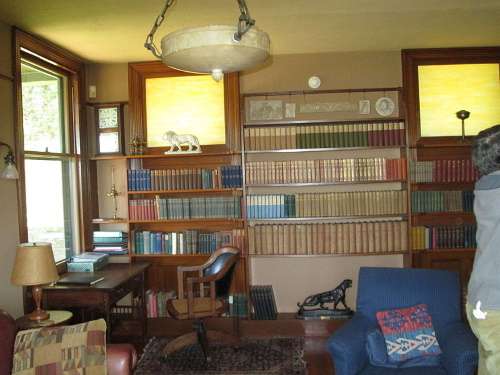Rudyard Kipling loved the four years he spent in Vermont, loved the seclusion, the golf, the leaves turning in fall. He would have stayed longer, but he got into a messy court battle with a charming drunk who happened to be his brother-in-law.
You probably associate Rudyard Kipling with British India, and you would be right. Kipling did, however, live in Dummerston, Vt., from 1892 until 1896.
Rudyard Kipling
Kipling was born in Bombay on Dec. 30, 1865 to English parents and educated in England. His short stories and novels made him famous as a young man. At 26, he married Caroline Balestier, a Vermonter. They moved to Vermont, near her family. Their first child, Josephine, was born in December 1892.
Kipling wrote in a tiny workroom where ‘from December to April the snow lay level with the window-sill.’ The stillness and suspense of that winter, along with his new daughter, inspired him to write the first of the Jungle Books for children. His Vermont years produced some of his best work. In Dummerston he wrote Captains Courageous, the Jungle Books and a book of poetry that included Gunga Din and Mandalay.
Rudyard Kipling loved the seclusion of Vermont and his ‘sane clean life.’ Sir Arthur Conan Doyle came for a visit and taught him to play golf. He could watch golf balls fly two miles downhill on the snow, and he especially loved watching the foliage turn in the fall.
Trouble began after they moved to the house they built, called Naulakha. Beatty Balestier lived across the drive. Beatty was big, hearty, open, improvident, impetuous and irresponsible. The Kiplings at first got along quite well with him, but then the relationship soured.
The Feud
In 1896, Beatty Balestier confronted Kipling on the road and accused him of blabbing that he bailed him out financially. Beatty told him to ‘retract those Goddamned lies you’ve been telling about me.’ He told him he had a week to apologize or he’d ‘punch the Goddamned soul out of him.’
Kipling went to his lawyer and had Beatty arrested and charged with assault three days later. The hearing that followed drew hordes of reporters who hadn’t had access to Kipling. It didn’t go well for him. On the witness stand he said he came to Vermont to help Beatty out, which exactly no one believed. Newspaper reporters portrayed him as a prig. The Vermont Phoenix quoted one story that said: “Almost to a man, the sympathy of the townsfolk is with ‘Beatty,’ as everybody calls him. Kipling, by his eccentric demeanor and his arrogant manner toward the residents of the town, has alienated many friends.”
One week before the hearing was to resume, Kipling and his family suddenly gathered their possessions and moved back to England.
In 1923, Kipling gave a speech in which he said, “Words are, of course, the most powerful drug used by mankind.” One wonders if he had in mind the words spoken during his terrible family feud.
The National Register of Historic Places now lists Naulakah, also a National Historic Landmark.
This story was updated in 2024. The image of Kipling’s library By Lou Sander – Own work, CC BY-SA 4.0, https://commons.wikimedia.org/w/index.php?curid=48423549.





3 comments
[…] congregated at the Fields’ home: Henry Wadsworth Longfellow, Ralph Waldo Emerson, Henry James, Rudyard Kipling, John Greenleaf Whittier, Mark Twain and Harriet Beecher Stowe. She presented herself as the […]
[…] feud with his brother-in-law drove the Kiplings from Vermont in 1896. The Holbrook family for many years owned Naulakha. Today […]
[…] to a family of prospectors. He and his wife Frances and their children would later settle in Dummerston, Vt. Flaherty's father was a mining operator and prospector, and he helped his son find work with the […]
Comments are closed.